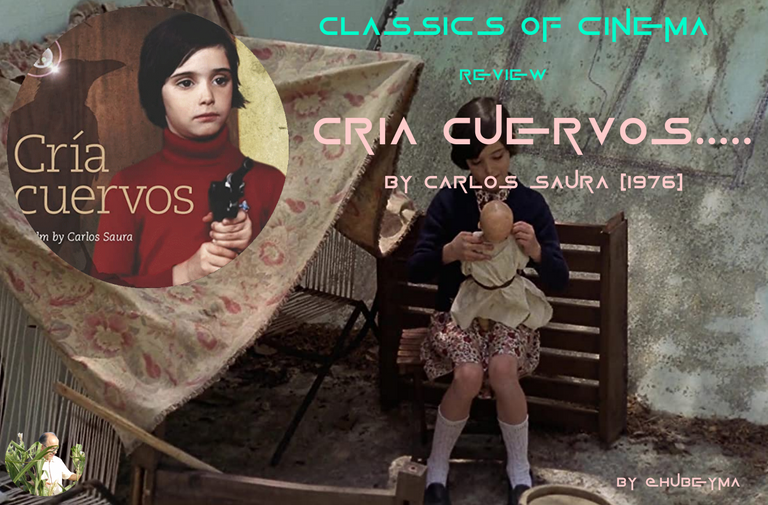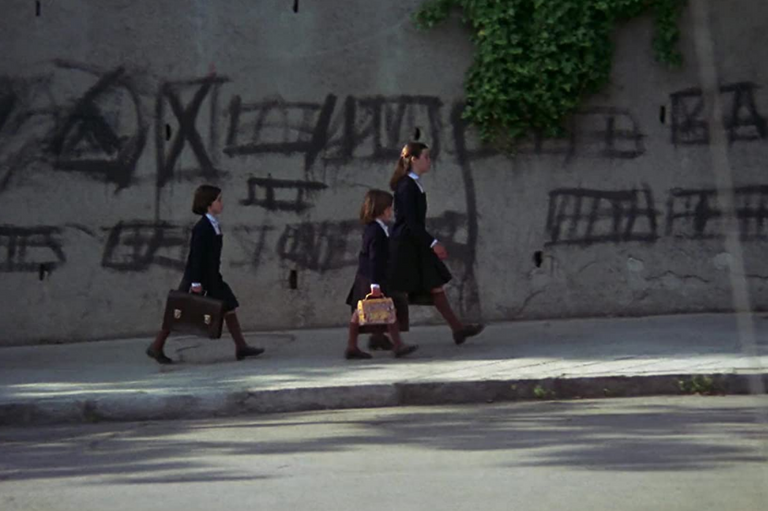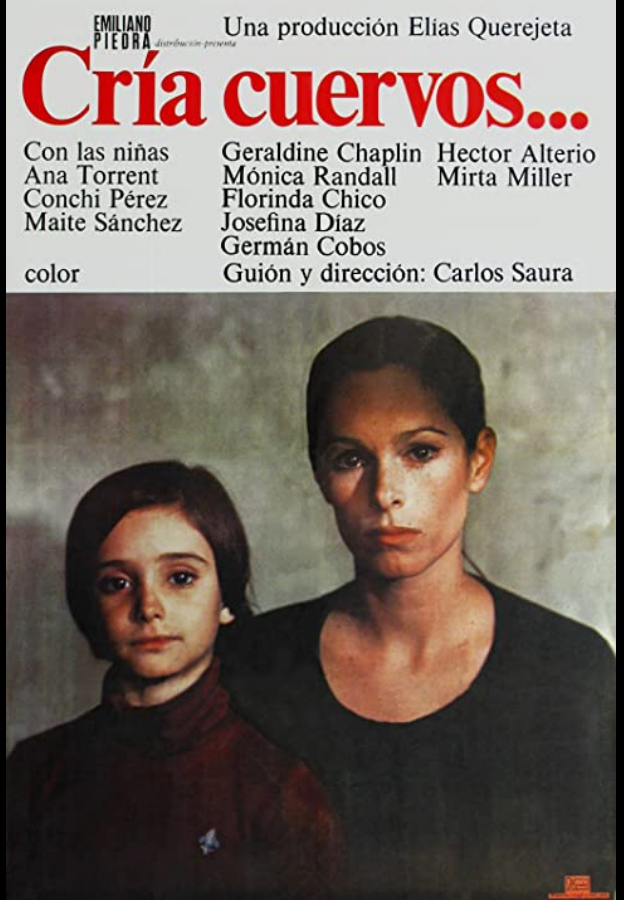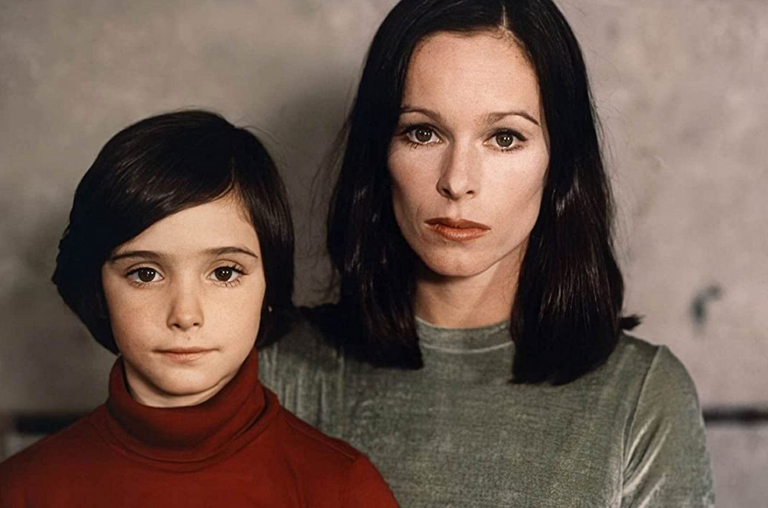
Hello dear #hivers cinephiles of @CineTV,
today I want to share with all of you a commentary on a film I saw many years ago and which I consider one of the masterpieces of Spanish cinema.
I'm talking about Cría Cuervos... (Raise ravens in english), a film directed by Carlos Saura in 1976 with the stellar performances of Geraldine Chaplin and Ana Torrent, winner of the Special Jury Prize at the 1976 Cannes Film Festival along with another film that marked an era: La Marquesa de O by Éric Rohmer.
The name of the film is the first part of the saying "raise crows... and they'll pluck out your eyes" and in it Saura develops a masterpiece in which he shows the defencelessness to which we are subjected as children and which we often forget as adults.
The film explores taboo subjects for those years, such as the loss of innocence, machismo and even euthanasia.
But let's keep in mind that the premiere of the film coincides with the end of the dictator Francisco Franco.
While the film was being shot, he was dying in his bed, and little by little Spanish cinema was beginning to show this reinvindication of values, this openness to the world and to a different society, from which it had been excluded for many years as a result of censorship and rigid control of the media.

As if to show through a family the political outcome of a Spain that was slowly disappearing, Saura shows - almost prophetically - how three girls witness the death of an authoritarian father (the figure Franco had reserved for himself for the Spanish people) and the period that accompanies his evolution.
For real-life Spaniards, this evolution towards a democratic social order with full respect for individual liberties was called the Transition.
For Saura's girls, on the other hand, it is also a period of uncertainty, which they spend in an endless summer with their aunt Paulina (played by Mónica Randall).
One of them, Ana (played by Ana Torrent as a child and Geraldine Chaplin as an adult) recalls with an almost historiographic precision all this sequence of events, on a personal and social level.
The memories of Ana as an adult are gradually accumulating in her memory, which is why Carlos Saura must continually resort to retrospective images, which in 1976 was not very easy.
Nowadays flashbacks are normal and recurrent in any film or television production, even those with a low budget. However, in 1976, using flashbacks and flashforwards in a non-explicit way was somewhat more complex.
The walls of the house where the three girls live are so oppressive that at times they remind us of the images of Luis Buñuel's El Angel exterminador (The Exterminating Angel) from 1962.
The constant tension in the home, the marital conflicts that end with the tragic death of the mother, the continuous arguments, poison the first adolescent years of the protagonist's life. As she herself says when she defines her childhood as a long, interminable and sad period, "where fear was everywhere and in everything".
Another of the other relevant aspects is the song Porque te vas (1975) - the song that in its day was a musical hit all over the world - by the Spanish-British artist Jeannete, which Ana used to listen to continuously and compulsively in the monotonous summer evenings in which her own life was passing by.
Saura's greatest merit in making such a singular film, outside the traditional archetypes of cinema up to that time, is the risk he took in the double sense of the word. On the one hand, the political one, since the film was confiscated because it was considered an attack on public order, morality and good customs.
And secondly because Spain's political transition was perhaps not as linear as Saura himself imagined, and this meant that, at first, the film was not sufficiently understood by a public that was not sufficiently prepared after being governed in an authoritarian and dictatorial manner for more than 40 years.
Perhaps the most beautiful moments of the film are when the girls are able to leave Madrid and enjoy their childhood in a more natural and pure way in an almost rural environment.
After all - metaphorically speaking - crows feel uncomfortable in big cities, like most birds, and prefer rural areas where they can finally fly free.
And that is where the title of the film really comes in.


Maite Sanchez as Maite
Mónica Randall as Paulina
Florinda Chico as Rosa
Josefina Díaz as la abuela
Germán Cobos as Nicolás Garontes
Héctor Alterio as Anselmo
Mirta Miller as Amelia Garontes

hoy quiero compartir con todos Uds. el comentario sobre una película que vi hace muchos años y que considero como una de las obras maestras del cine español.
Me refiero a Cría Cuervos... película dirigida por Carlos Saura en el lejano 1976 con las actuaciones estelares de con Geraldine Chaplin y Ana Torrent, ganadora del premio el Premio Especial del Jurado del Festival de Cannes de 1976 junto a otro fil que marcó una época: La marquesa de O de Éric Rohmer.

El nombre de la película es la primera parte del refrán "cría cuervos.. y te sacarán los ojos" y en ella Saura desarrolla una obra maestra en la que muestra la indefensión a la que estamos sometidos siendo niños y que muchas veces olvidamos siendo adultos.
La película explora temas tabú para esos años como la pérdida d ela inocencia, el machismo y hasta la eutanasia.
Pero ubicarnos en el tiempo tengamos en cuenta que el estreno de la película coincide con el fin del dictador Francisco Franco.
En efecto mientras la película se filmaba éste agonizaba en su lecho y de a poco el cine español comenzaba a mostrar esa reinvindicación de valores, esa apertura hacia el mundo y hacia una sociedad distintas, de los que había estado excluído durante muchos años como consecuencia de la censura y un rígido control de los medios expresión.

Como si quisiera mostrar a través de una familia el desenlace político de una España que desaparecía de a poco, Saura muestra -casi proféticamente- como tres niñas son testigos de la muerte de un padre autoritario (la figura que Franco se había reservado para con el pueblo español) y el período que acompaña su evolución.
Para los españoles en la vida real esa evolución hacia un orden social democrático con pleno respeto de las libertades individuales se llamó Transición.
Para las niñas de Saura en cambio es un perído también de incertidumbre que transcurren en un interminable verano con su tía Paulina (inerpretada por Mónica Randall).
Una de ellas Ana (interpretada por Ana Torrent de pequeña y Geraldine Chaplin de adulta) va rememorando con una precisión casi historiográfica toda esta secuela de acontecimientos, a nivel personal y social.
Los recuerdos de Ana adulta se van agolpando en su memoria por lo cuúl Carlos Saura debe recurrir de continuo a imágenes retrospectivas que en el año 1976 no era muy fácil.
En la actualidad los flasbacks son sormales y recurrentes en cualquier producción cinematográfica o televisiva, aún en las de bajo budget económico. Sin embargo en 1976 acudir a flashbacks y flashforwards de manera no explícita era algo más complejo.
Los muros de la casa donde habitan las tres niñas resultan tan opresivos que a vece snos hacen recordar las imágenes de El Angel exterminador de Luis Buñuel del año 1962.
Esa continua tensión en el hogar, los conflictos conyugales que se terminan con la trágica muerte de la madre, las continuas discusiones, van envenenando los primeros años adolescentes en la vida de la protagonista. Como ella misma dice cuando define el período de su infancia como un período largo, interminable y triste, «donde el miedo se manifestaba por todoas partes y en todas las cosas».
Otro de los aspectos relevantes relevantes es el tema Porque te vas (1975) -la canción que en su momento fue un hit musical en todo el mundo- de la artista hispano-británica Jeannete, que Ana slía escuchar de manera continua y compulsiva en las tardes veraniegas, monótonas en que iba transcurriendo su propia vida.
El mayor mérito de Saura en hacer una película tan singular, fuera de los arquetipos tradicionales del cine hasta ese momento, es el riesgo que corrió en el doble sentido de la palabra. Por un lado el político ya que la película fue confiscada por considerarse atentatoria al orden péblico, la moral y las buenas costumbres.
Y en segundo lugar porque la transición política de España no fue, tal vez, tan lineal como el mismo Saura imaginó, y esto llevó a que, al principio, la película no fuera lo suficientemente entendida por un público que no estaba lo suficientmente preparado después de ser gobernado en forma autoritaria y dictatorial por mas de 40 años.
Tal vez los momentos más bellos de la película sean cuando las niñas pueden dejar Madrid y disfrutar de su infancia de una manera más natural y pura en un ambiente casi rural.
Al fin y al cabo -metafóricamente hablando- los cuervos se sienten incómodos en las grandes ciudades, como la mayor parte de las aves, y prefieren las zonas rurales donde pueden, por fin, volar libres.
Y ahí entemos verdaderamente el título de la película.


Ana Torrent como Ana niña
Geraldine Chaplin como Ana adulta / La madre
Conchi Pérez como Irene
Maite Sanchez como Maite
Mónica Randall como Paulina
Florinda Chico como Rosa
Josefina Díaz como la abuela
Germán Cobos como Nicolás Garontes
Héctor Alterio como Anselmo
Mirta Miller como Amelia Garontes
Fuente: IMDB.
Fonts to compose the initial image of the post:
Fuentes para componer la imagen inicial del post:
https://www.imdb.com/title/tt0074360/mediaviewer/rm352487169/
https://www.imdb.com/title/tt0074360/mediaviewer/rm458003201/


Some Spanish movies are always hit on the spot, like Thesis(1996)
I loved this movie too.
There are several Spanish directors who have made excellent films, among them Alejandro Amenábar - a Chilean who became a Spanish citizen - who directed Thesis - his first film - in 1996, which you rightly mention and which won many awards, deservedly so.
If you remember the characters you will find Ana Torrent, the same one who played one of the girls in this review.
From Amenábar I really liked Mar Adentro with a phenomenal Javier Bardem.
Greetings and thanks for commenting.
Great review with some relevant history included in it.
This is indeed an amazing movie and a Spanish classic.
Now if I had to pick another 1970s favorite ( starring the same wonderful young actress ), it would be Victor Erice's Spirit of the Beehive. Love that one!
It is a great film with the particularity that Victor Erice made only two feature films in his entire career as a director. The remaining one is ElmSur at a distance of 10 years.
Actually, I don't know which one to choose from that period of Spanish cinema. El Crimen de Cuenca is impressive.
The films of Luis Buñuel and Pedro Almodóvar are unforgettable. They contain a social criticism rarely seen.
Greetings and thanks for commenting @vincentnijman.
El Sur was pretty good though but didn't make a lasting impact on me.
Buñuel sure made some great stuff and Almodovar is an auteur of whom I love some films but don't really like a lot of others.
I will dig into my watch list one of these days and see with what other Spanish classics I can come up with ( I used to study film in Uni - half a life time ago - and probably watched over 5000 movies so I'll need to do some digging )
The rewards earned on this comment will go directly to the person sharing the post on Twitter as long as they are registered with @poshtoken. Sign up at https://hiveposh.com.
Your content has been voted as a part of Encouragement program. Keep up the good work!
Use Ecency daily to boost your growth on platform!
Support Ecency
Vote for new Proposal
Delegate HP and earn more
Congratulations @hubeyma! You have completed the following achievement on the Hive blockchain and have been rewarded with new badge(s):
Your next target is to reach 20000 upvotes.
You can view your badges on your board and compare yourself to others in the Ranking
If you no longer want to receive notifications, reply to this comment with the word
STOPCheck out the last post from @hivebuzz:
Support the HiveBuzz project. Vote for our proposal!
1UP
Great pick indeed!